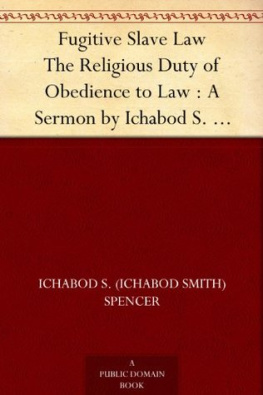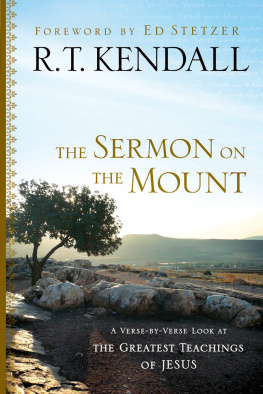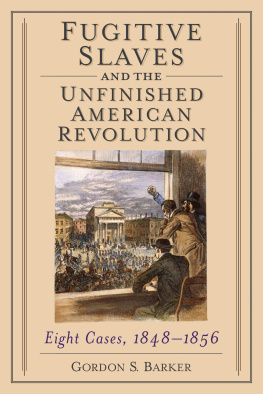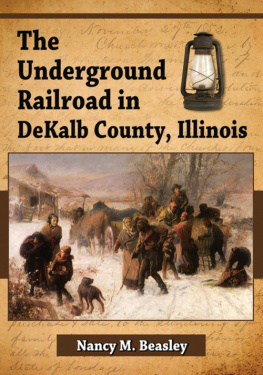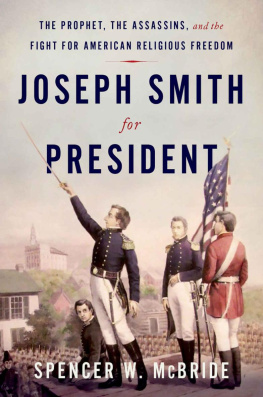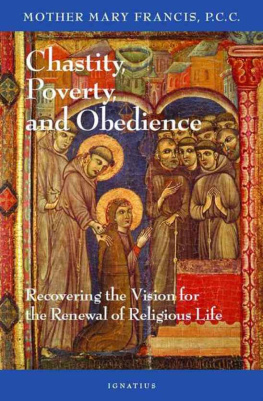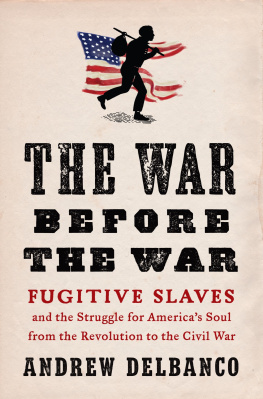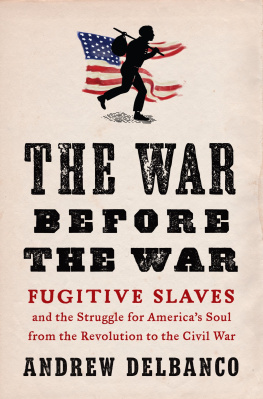The Project Gutenberg EBook of The Religious Duty of Obedience to Law
by Ichabod S. Spencer
This eBook is for the use of anyone anywhere at no cost and with
almost no restrictions whatsoever. You may copy it, give it away or
re-use it under the terms of the Project Gutenberg License included
with this eBook or online at www.gutenberg.org
Title: The Religious Duty of Obedience to Law
A Sermon by Ichabod S. Spencer Preached In The Second Presbyterian
Church In Brooklyn, Nov. 24, 1850
Author: Ichabod S. Spencer
Release Date: November 9, 2004 [EBook #13988]
Language: English
*** START OF THIS PROJECT GUTENBERG EBOOK OBEDIENCE TO LAW ***
Produced by Curtis Weyant, Andrea Ball and the Online Distributed
Proofreading Team.
FUGITIVE SLAVE LAW.
THE
Religious Duty
OF
OBEDIENCE TO LAW:
A
SERMON,
Preached in the Second Presbyterian Church
IN BROOKLYN, NOV. 24, 1850.
BY ICHABOD S. SPENCER, D.D.
NEW YORK:
PUBLISHED BY M.W. DODD,
BRICK CHURCH CHAPEL, CITY HALL SQUARE,
OPPOSITE THE CITY HALL.
1850.
TO THE REV. DR. SPENCER:
The undersigned having listened, with much pleasure and as we hope profit, to the Sermon which you delivered yesterday morning, most respectfully request a copy of the same for publication, believing that much good may be done to the cause of Religion and Law, by the dissemination of the truths expressed therein.
Brooklyn, Monday, Nov, 25, 1850.
JASPER CORNING,
FRANCIS H. ABBOTT,
LEBBEUS CHAPMAN,
F. DEMING,
GEORGE A. TALBOT,
A.M. FENBY,
THOMAS COCHRAN,
WM. BARBOUR,
J.B. WICKHAM,
SAMUEL HUTCHINSON,
WM. H. AMES,
L. HOPKINS,
JARVIS BRUSH,
S.N. BROWN,
GEORGE P. LORD,
H.K. CORNING,
THOS. BAYLIS,
W.K. BROWN,
M.S. GOODMAN,
JAS. WILDE, JR.,
GEO. A. TOWNSEND,
DAVID B. BAYLIS,
HENRY W. BARNES,
ELI MERRILL,
W.M. SANDS,
ISAAC OTIS,
ALANSON TRASK,
CHARLES CLARK,
JOHN T. LAWRENCE,
A.S. MARVIN,
WM. M. HARRIS,
R.R. FIELD,
SAMUEL T. HUBBARD,
RICHARD W. HUBBARD,
A.G. TRASK,
JOHN H. PRENTICE,
WALDO HUTCHINS,
E.L. BUSHNELL,
SUMNER STONE,
JOSEPH STEELE,
JAS. McLEAN,
J.C. MEEKER,
J.S. PIERSON,
A.G. JENNINGS, JR.,
B.W. DELAMATER,
W. SPENCER,
J.C. DURYEA,
A. CRITTENDEN,
HENRY ROWLAND,
WM. BULLARD,
JN. BULLARD, JR.
To JASPER CORNING, Esq., AND OTHERS:
GENTLEMENThe sermon which you have requested, prepared without a single thought of its publication, and amid a pressure of other duties, I submit to your disposal;governed more by your judgment than my own, in reference to its fitness for the press.
Yours, very truly,
I.S. SPENCER.
Brooklyn, Nov. 26, 1850.
SERMON.
Titus, III. 1. Put them in mind to be subject to principalities and powers to obey magistrates, to be ready for every good work.
Ro. xiii. 1-7. Let every soul be subject unto the higher powers. For there is no power but of God, the powers that be, are ordained of God. Whosoever, therefore, resisteth the power, resisteth the ordinance of God, and they that resist shall receive to themselves damnation: (harm, loss, or ruin). For rulers are not a terror to good works, but to the evil. Wilt thou then not be afraid of the power? do that which is good and thou shalt have praise of the same: for he is the minister of God to thee for good. But if thou do that which is evil, be afraid; for he beareth not the sword in vain: for he is the minister of God, a revenger to execute wrath upon him that doeth evil. Wherefore ye must needs be subject, not only for wrath, but also for conscience' sake. For, for this cause pay ye tribute also, for they are God's ministers, attending continually upon this very thing. Render therefore to all their dues: tribute to whom tribute is due; custom to whom custom; fear to whom fear; honor to whom honor.
There are two great classes of human duty. One of them embraces duties which we owe to God, the other embraces duties which we owe to men.
This classification of duties received the sanction of Jesus Christ, when he spake of loving the Lord our God with all our heart, as the spirit and sum of the one class of duties, and of loving our neighbor as ourselves, as the spirit and sum of the other class of duties. It had also been previously taught at Mount Sinai, when God gave to Moses the two tables of the lawthe one enjoining our duty to God, the other enjoining our duty to man.
This classification of duties is not arbitrary. It is founded on truth and nature. Men have relations to God, as their Creator, Upholder, Governor, Redeemer, and rightful Judge; and they are bound to recognize these relations, and feel and act accordingly. Men hold relations to one another, as parents, children, citizens, rulers, and subjects; and they are bound to recognize these relations, and feel and act accordingly. Such is the will of God. Such is the law of God. There can be no holiness in man aside from conformity to the will of God in this thing.
This principle is carried out in all the teachings of the New Testament, with an emphasis and a plainness which no candid and unprejudiced mind can fail to understand. Jesus Christ has incorporated it into his sermon on the mount in many particulars, wherein he insists upon our social duties, while he teaches religion. He preached this principle when he said, "render unto Caesar the things that are Caesar's, and unto God the things that are God's." He practised on this principle when he made the fish bring in his mouth the tribute-money which, as a citizen, he owed to the government of the country,a government a thousandfold more oppressive than ours.
It would be a fundamental error, if we were to maintain, that religion has nothing to do with the regulation of our conduct towards one another,as parents, as children, as magistrates, subjects and citizens; but that it has left all that field of duty to be regulated by the individual preferences of men. It has not done so. Social duties come as really within the field of religious obligation, as any other duties. "The fifth commandment requireth the preserving the honor and performing the duties belonging to every one in their several places and relations, as superiors, inferiors, and equals." As men, in any relationship we hold, neighbors, citizens of the state, children, parents, or any other earthly connection, religion extends its authority over us; and our conduct in each one of these relationships constitutes a part of our holiness or our sin.
God has not seen fit to enact special or particular laws for us, to regulate our conduct in all respects, as here associated with one another, and owing duties to one another, as neighbors, citizens of the commonwealth, husbands, wives, and children. He has himself enacted only general laws for us,laid down great general principles, under the authority and light of which, he has left men to regulate the particulars as they please, by the governments which they establish.only not contravening his great general principles and laws.
He has himself made all the laws which are needful, and all which can be justly obligatory upon us in respect to divine worship,such duties as praise, prayer, preaching the gospel, and observing the sacramental ordinances;and no human authority may either repeal these laws or add to them. But in respect to the duties which we owe to our neighbor, that is, to our fellow-man, in any relation he holds to us or can ever hold; God has left the most of these duties to the authoritative decision of human governments. He has thus made a difference betwixt these two classes of duties. The reason for this difference seems to be this; namely, man's wisdom can reach farther in ascertaining what is fit or right betwixt him and his fellow-man, than in ascertaining what is fit or right betwixt him and his God: and consequently, man can legislate in respect to property, and other matters of human right, but not in respect to prayer, and other matters of the first class of duties. Moreover, in respect to worship, God is himself one of the parties. The parties are not man and man, as they are in all social duties; but they are man and God:and therefore, it would seem but fit and natural, that God should legislate

